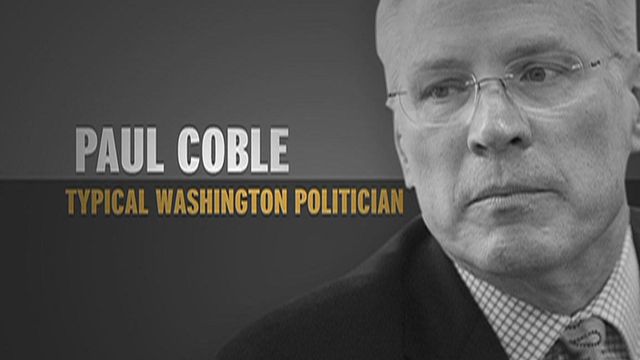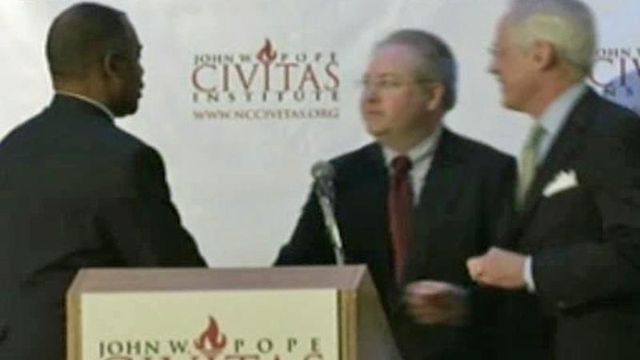Fact check: Holding Super PAC attacks Coble
A new 30-second spot accuses Paul Coble of supporting debt increases as a commissioner. Is that accurate?
Posted — UpdatedA new campaign ad is on the air in the 13th Congressional District's Republican primary.
Super PACs are organizations that may not be directly controlled by a candidate or coordinate with their campaign but can take unlimited contributions from donors. American Foundations is controlled and funded by Holding friends and family.
“Paul Coble is a typical Washington politician and his record proves it," starts the 30-second spot. "Coble criticizes Congress for increasing the debt by 50 percent, but since 2006, Paul Coble has supported the commission raising its debt 93 percent. The numbers to remember: Paul Coble has run for office nine times, supported increasing the county debt 93 percent. Paul Coble: 9 – 9 - nein.“
That last "nein" is meant to be a reference to the German word for "no" and completes the shout-out to former presidential candidate Herman Cain's 9-9-9 tax plan.
Puns and name-checks aside, WRAL News wanted to know if the factual claims in the ad are true.
Coble has never served in Congress and never run for Congress before. Nothing on his resume indicates he's ever worked in the District of Columbia.
"Paul has been a businessman here in Raleigh for 31 years," said Mark Stephens, a strategist with the Coble campaign.
"Washington politician" has become something of a generic insult in political circles, so one could write this off as rhetorical hyperbole. But in the strictest sense of the words, this doesn't seem to be an accurate claim.
This is true.
Coble ran for Raleigh City Council in 1993, 1995 and 1997. He ran for and won the mayoral election in 1999. In 2001, he lost his re-election bid. He then lost a 2002 state senate campaign. Coble then ran and won Wake County commissioner campaigns in 2006 and 2010. He is now running for Congress.
Whether those terms in office add up to "solid experience" or "too much time in office" is something for voters to decide.
Coble's campaign does note that all of his elected positions thus far have been officially part-time.
The ad doesn't provide a citation for this claim but we asked Palmer Sugg, a Raleigh lawyer and one of American Foundations' organizers, for backup.
However, this third claim ignores some significant history.
It is true that Wake County’s debt has increased since 2006. According to the county budgets, Wake County owed $1.49 billion in principle and interest on bonds in 2005. That has risen to roughly $2.46 billion in bond debt in 2012. However, it’s worth pointing out that the county is well within the legal limits set for borrowing and its budget is balanced -- as required by law – unlike the federal budget.
But Coble was not a member of the Wake County Board of Commissioners until December 2006, after the board voted to send a $970 million school bond to voters. Voters approved the bond issue at the same time they elected Coble.
In 2007, the Wake County commissioners voted to send $187 million in bonds to a voter referendum, and voters did pass those bonds for libraries, open space and Wake Technical Community College.
So what exactly did Coble vote for?
Once voters approve a bond issue, county governments must subsequently vote to issue bonds in blocks. Coble did vote in favor of these actions to execute the bond sales, after they had been approved by voters.
"That becomes perfunctory," Stephens said. "I think he made his position very plain." Stephens further pushes back against the ad's suggestion Coble is a big spender by pointing out that budgets under Coble's supervision as chairman of the county commissioners reduced overall spending.
Stephens calls the ad's assertion on this point "a distortion."
But Sugg said "a vote's a vote." And those votes did, in fact, cause the county to borrow money, albeit borrowing approved by voters. "So, yes, it's fair. And it's accurate.
As for Stephens push-back against the ad, Sugg called it "more Washington double-speak."
• Credits
Copyright 2024 by Capitol Broadcasting Company. All rights reserved. This material may not be published, broadcast, rewritten or redistributed.






